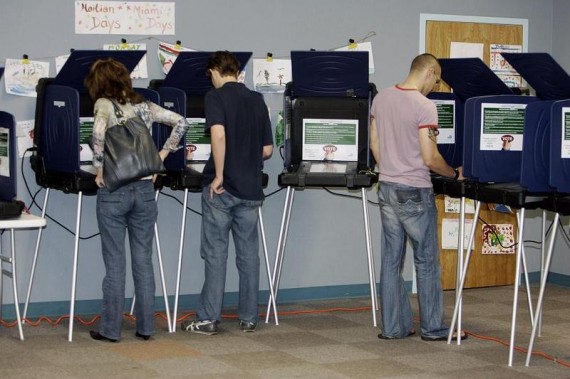Paragraph of the Day (Running for Office Edition)
To paraphrase Rumsfeld: you go to the ballot box with the candidate you have, not the candidate you want, or would like to have.
 Walter Shapiro, writing at the New Republic:
Walter Shapiro, writing at the New Republic:
Of course, the current none-of-the-above mood among many Republican loyalists could simply be viewed as a vote of no-confidence in the bizarre way that we choose presidential nominees (eight months devoted to wooing 120,000 Iowa GOP caucus-goers). It is as if the Republicans finally grasp the Catch-22 of contemporary campaigning: Anyone who runs for president in an era of cell-phone cameras and Tweet-deck reporters is too crazy ever to be allowed control over nuclear weapons.
The focus on Republicans in the paragraph is because the piece is about the longing, in some quarters of the GOP, for candidates not running (e.g., Daniels, Christie, even Jeb). The basic sentiment is universal in nature, I should think, transcending not only partisan lines, but international barriers.
At a minimum, one does often feel as if the people who run for office are the ones we really least want for office. Indeed, to paraphrase Rumsfeld: you go to the ballot box with the candidate you have, not the candidate you want, or would like to have.
The lament over the quality of candidates is an age-old one, but it always seems worse in real time, I think. The funny thing is, practically every president we have ever had, save perhaps Washington, has been perceived by some substantial part of the population as, well, an idiot unfit for election (and there, in fact, people who thought that even about Washington). And yet, many of those selfsame idiots are now considered Great Americans (and in a nonpartisan way, often).
The above from Shapiro reminds me of this classic bit from the Hitch-Hiker’s Guide to the Galaxy (the radio version):
The major problem – one of the major problems – for there are several – one of the many major problems with governing people is that of who you get to do it. Or, rather, of who manages to get people to let them do it to them. To summarise: it is a well-known and much lamented fact that those people who most want to rule people are, ipso facto, those least suited to do it. To summarise the summary: anyone who is capable of getting themselves made president should, on no account, be allowed to do the job. To summarise the summary of the summary: people are a problem.
This is all a combination of amusing and depressing, although ultimately it is also the case that there are far worse alternatives. There is a reason that Churchill said that “Democracy is the worst form of government, except for all those other forms that have been tried from time to time.”
And, really, despite all the angst and hand-wringing, we have ultimately done relatively well over the years.






I’ll check back in about five years and see if this quote holds up.
Always fair, of course.
I was pretty much going with the last two and quarter centuries, so I think I have some long-term data to work with.
A post I mostly like. When it is time to go to war, one goes with the military that one has not with the one he wish he had. Your parody holds basically true when you go to vote. The candidates on the paper are the choices you are stuck with.
However you ignored the build up process getting to that point. One should build a military that is close to what you want to go to war with. There are many obstacles in doing so and one will likely not end up with what one wants when you do end up going to war. However chances are if you fight for what you want the military will be much closer than if you don’t fight at all.
Same goes for candidates. There is a purpose behind the primaries. Fight to recruit the candidates or at least the type of candidates you want and there is a much better chance your candidate will be much “closer” to what you want than if you don’t. They may not be exactly what you want but probably better than if you do nothing.
That is why I encourage people Tea Party or not to get involved with the primaries. That way they have “more” of a say in who their candidates are instead of just voting between candidates that others have selected.